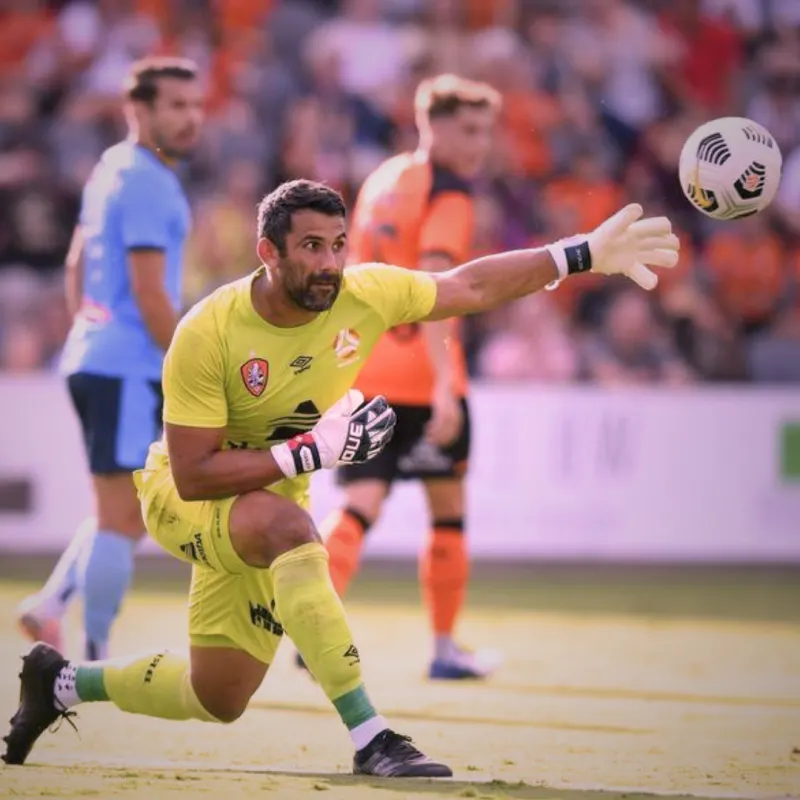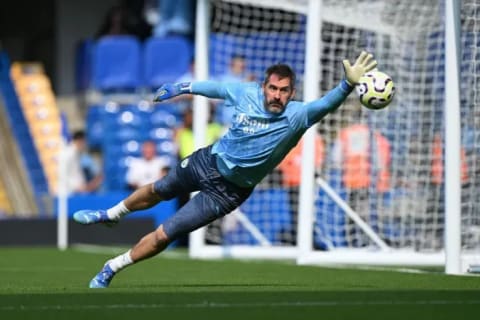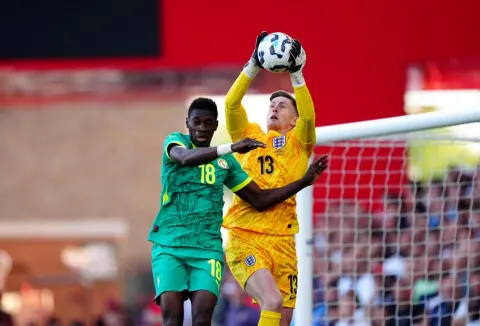A life in goalkeeping that took one man to the other side of the world and back…
Like many young Australians, Jamie Young loved playing sports. After being raised in a strict Brisbane household by a Scottish father and a Sri Lankan mother, Young had firm boundaries from a young age. There were no house parties and excessive socialising was off the cards. But this firm grounding, along with a love of football, gave Young the focus, determination and diligence to pursue a professional football career.
From the age of 12, the Aussie had an interest in goalkeeping and just a few years after taking up the position, he was presented with a once-in-a-lifetime chance - to secure a professional contract in England.
“Moving to the other side of the world on my own at 15 was a big move, I suppose.
“I was playing in the National Youth League in Australia at the time and I got spotted by an agent/ex-player, Andy Bernal. He had played for Ipswich and Reading and he was the guy who got me a trial at Reading.
“He basically said, ‘You’ve got a ticket and in two weeks time you fly’ and that was it.”
Young had no hesitation about boarding the plane and heading 10,000 miles across the world to Berkshire to become a footballer.
“I fell in love with the game and the culture of football and it wasn’t a hard decision to make because it was the thing I was waiting for, so when they said you’ve got a trial, I was like right, where's the plane?
“When you’re young and precocious, you don’t really comprehend the gravity of something like that, but at the time, that’s all I ever wanted to do.”
Everything happened quickly and the magnitude of what was at stake was laid bare in a welcome meeting for new recruits at Reading’s academy in 2001. Before he even had time to shake off the jet lag, Young knew he was ready for the challenge.
“I remember the first day at Reading, the Academy Director Nicky Hammond said in the induction, ‘I want to thank you all for coming and you’ve done fantastically well to get to this stage, but I want you to know that not everyone in this room will make it as a professional footballer”
“I had just got off the plane from Australia and I thought, f*** that, I’m going to make it!”
Young demonstrated his goalkeeping talents and he was ready to move on from his previous life in Brisbane for a shot at a professional contract.
“I impressed enough where they said we want to offer you a contract and it was just the biggest thing in my life, I was just absolutely elated with that opportunity. I went back to Australia to finish one term of school and then I dropped out and moved to England.”
It began a long career in England, which got off to a flying start. Young was thrust into the under-17 team at Reading but also made such an impact that he was called up to the England under-17 side. He would also go on to represent England up until under-21 level.
Young was competing amongst the country's best youth talent, featuring alongside the likes of a budding Wayne Rooney and James Milner. It helped reassure him that he belonged in the elite environment.
Yet, the former Young Lions goalkeeper looks back on his England youth experiences with conflicting feelings.
“In one sense, you’re thinking, yeah this is where I am, and in another way, you do come across incredible talents that are world-class and the best of generations too.
“But the one thing I wish I had was someone to guide me through those camps a little bit better in terms of appreciating it, setting a narrative for me to go in, not just letting me figure it out on my own, but saying savour and enjoy these moments. Every bit of experience from these camps and these players will serve you for the rest of your career.”
Although Young had found his feet on the pitch, adapting off it wasn’t easy. As an Australian having to get used to a new country on the other side of the world, Young often felt he was an outside, reinforced by the actions of unwelcoming teammates.
“I certainly didn't have support from my teammates. They saw me as an Australian, which in football is not a high social currency, and also it was competition for a professional contract so people would try to step on my head from time to time.”
Yet, there was one former coach he credits in particular with supporting his settlement in England. Eventually, the Aussie stopper signed a professional contract with Reading and he developed a strong relationship with Brendan Rodgers, who was coaching in the Royals’ youth setup.
“He helped me to get a professional contract to be honest.
“His support through those difficult times was invaluable. He was somebody I could go to and say, look someone has stolen my tracksuit, can you get a new one, and he was someone I thought I could lean on.
“Brendan had this ability to make you feel like he believed in you. He’s a very supportive person, quite a warm person and he’s not a ranter and raver. I think I warmed to that.”
Rodgers' lessons in man management would stay with Young in another sense as his career progressed. Two years ago, the then-36-year-old was using his own experiences under both Rodgers, ex-Reading manger Alan Pardew, and a plethora of A-League coaches as the basis for a PhD on the psychology of sports coaching and, specifically, the coach-athlete relationship.
In an interview with the Guardian, Young spoke of his intent to ‘to understand why coaches are behaving the way they do, and the players as well, and the expectations around this relationship in our environment.’
Rodgers' and Pardew's methods were starkly different. The former had an arm round the shoulder approach that Young, as he notes, warmed to. Pardew, meanwhile, actively tested players' resillience. Both experiences, in different ways, would set him up for the footballing tribulations to come after leaving Reading.
After five years with the Royals, Young was released after making just one senior appearance. Long-term spells with Wycombe and Aldershot in the Football League followed. However, going from a progressive, high-level environment with big aspirations in Reading (who were a Premier League side at the time), into the deeper reaches of English football was a steep learning curve.
“When I left Reading, I really got thrust into the big bad world of football, where it’s dog eat dog and people are not in your corner and will get you out of a job if it means they can get one.
“I think when you filter down the leagues, it's about leverage and you’re fighting and scrapping and everyone’s scraping so you don’t realise how good it was at the top. You’re a bit sheltered from the savage nature of the football industry.”
In addition, Young highlighted the potential pitfalls of playing football for your livelihood. In the 2000s and 2010s, wages were lower, professionalisation was less common and some players were on part-time contracts lower down the Football League.
“I had to play for my mortgages, I was making decisions like coming back from injury early. I had a concussion one game where I had to come back early and put my life on the line because I’m trying to keep the second choice away so I can get a contract for the next year and that’s just the reality of a working-class footballer.”
After three years with Aldershot, Young’s career came to a crossroads. After over one hundred appearances for the Shots, he was confronted with a tough choice after they were relegated to non-league at the end of the 2012/13 season.
Despite having an individually strong campaign for Aldershot, Young felt that a move to non-league football was not the best career choice.
“The year I finished at Aldershot was the year where I ended up getting Players Player of the Year and Supporters Player of the Year and we got relegated.
“Unfortunately, they went into the Conference league and I didn’t want to be living all the way from Australia to play non-league football, it just wasn’t for me. It’s not that I’m big time or anything, I was like, if I’m going to be here, I’m not going down to that level because I know if I go down then that’s it, I’ll never come back to professional football.
But a period of deep uncertainty followed. Young spent the next year seeing the unglamorous side of football - making ends meet by playing for several non-league sides including Whitehawk, Basingstoke, and Hayes and Yeading. Simultaneously, Young was studying for a bachelor's Degree in Exercise and Sports Science, which he began after sustaining a long-term injury at Wycombe.
Reflecting on his internal battle during the 2013/14 season, Young explains that it was a difficult period on the pitch, playing for low wages and living off savings. Once again, he came to another professional juncture.
Although, things were more positive compared to the previous year. Young had completed his undergraduate degree and the Brisbane-born goalkeeper received an opportunity to play for his hometown club.
“It was an interesting period of my life where I was happier finishing my degree rather than committing to football.
“When I finished my degree, I was offered the opportunity to pursue a PhD in Human Genomic Research in professional football, but I turned that down and got the opportunity to come back to Brisbane Roar, which was fantastic.
“Coming back to play football in Australia revived my playing career, otherwise that would have been it and I probably would have become an academic.”
The move was hugely successful for Young, despite being initially “hated” by the Brisbane faithful for challenging fan favourite and five-time A-League winner Michael Theo.
Other than the somewhat frosty welcome, it was no surprise, given Young’s grafting in the lower leagues in England, that he was ready to seize his chance at making it in the A-League with Brisbane.
“I knew if I had another opportunity in professional football I wasn’t going to let it slip and do everything I could. Now I’m playing at home, with my family, there’s a lot more safety, a lot more certainty in my life and I knew I could flourish in that league.”
Young made over 150 appearances for Brisbane Roar and achieved individual success, winning the A-League Goalkeeper of the Year award in 2016/17 and making the PFA A-League Men's Team of the Season twice.
It was a time Young looks back on with great fondness, not just for the success as a goalkeeper, but for coming through the tough times to do so well for a club he loves.
“I did play some of the best football in my career.”
“But all my friends would go to games, it would be something to talk about and that did give me some pride, knowing that I’d come in this full circle and I just thought wow, playing in a 55,000 seater stadium now compared to when I was playing in front of a man and a dog in England, I thought, yeah, this is why I went through all those times, for moments like these.”
Young’s topsy-turvy career may appear a little chaotic on the surface, but each experience, setback and knock served as a learning purpose. A common theme and a non-negotiable for the 37-year-old is hard work. Whether it was trying to burst onto the scene at Reading, grinding in the lower leagues or becoming number one at Brisbane Roar, Young has maintained this trait throughout his career, which has lasted for over 20 years.
Now in the twilight years of his career, and with plenty of experience of the trials and tribulations of trying to make it at all levels of football, Young is grateful for how his academia, along with his football career has shaped him into who he is today.
“I went from a sledgehammer to a more articulate scalpel", he concludes.
In searching for the footballing life he dreamed of on the other side of the world, what Young always desired turned out to be on his doorstep.








